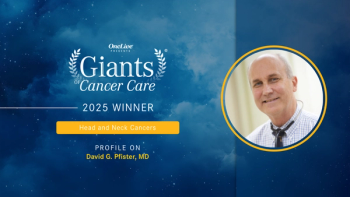
Goals of Therapy for HNSCC
Transcript:Ezra Cohen, MD: Along those lines, Tanguy, we’ve talked about how the decisions are made. But what’s the goal of treatment? And take us through the different scenarios and how you decide that.
Tanguy Y. Seiwert, MD: I think we are lucky in head and neck cancer because we can cure many, many patients. So, for early stage, it’s either oftentimes single-modality surgery or single-modality radiation. And that’s relatively straightforward, although even there, there are toxicities. For intermediate-stage, again, the goal is cure, and that’s where the multidisciplinary team approach actually comes in. Even for locoregionally advanced disease, we cure the majority of patients, and that’s really when everybody has to work together because we treat these patients aggressively.
In addition to curing patients who are potentially curable, we also want good functional outcomes. Obviously, there are implications from all treatments. If you have a tongue tumor, if you have a larynx tumor, you want to preserve speech and swallowing; functional outcomes are paramount. And there’s a balance. I think, again, that’s where the multidisciplinary team comes in and says, “The implications of doing radiation or surgery are this and this.” And it’s not a standardized approach for everybody. I think there’s a little bit of a balance.
So, I would say the most important outcomes, first, are cure; second, good functional outcomes. But once we then move on to patients who have recurrences who have metastatic disease, the goal changes somewhat to prolonging life and that’s where I think the role of the medical oncologist becomes somewhat bigger, although some patients are salvageable with aggressive approaches being a large surgery or reradiation. But, by and large, it’s that sequence of goals, and I think patients obviously also have a big say in that because not everybody has the same goal.
Ezra Cohen, MD: Absolutely. Viktor, you talked earlier about individualizing therapy, and I’m going to guess that that also applies to the goals of therapy. Tell us a little bit more about how you approach it.
Viktor Grünwald, MD: Well, I think as Tanguy said, cure is really what we would like to deliver to our patients, but certainly you have different patient populations. And some of them are not fit enough to go for multimodality therapy, and some of them, especially those that are older ones, they may not really like to have a very aggressive therapy. They’re more served with, let’s say, something that preserves quality of life and gives them a functional approach. We talk about multimodality teams, but there’s enough room for the wish of the patient, so what’s the patient’s perspective on the whole thing? We also take that into account when we make our decision, of course. And I think it’s true for you as well. So, despite having the medical perspective, there’s also patient perspective. We try to balance that for each individual patient.
Ezra Cohen, MD: And, Kevin, let me turn to you. I’ve heard you talk about some patients, even with locally-advanced disease, where the goal shifts from cure to palliation. And tell us a little bit about patients where maybe cure isn’t appropriate as a goal.
Kevin Harrington, MD, PhD: Wherever possible, of course, it’s incumbent upon us to try to seek curative treatment modalities for our patients. And when you have what looks like locoregionally advanced disease, then you would always approach the patient hoping to achieve that. But if we look at a group of patients, for instance—and this is an increasing segment of the population that we see in my practice—more elderly patients, patients with severe comorbidities, preexisting lung disease often related to their prior tobacco use, preexisting cardiac and cardiovascular morbidities, and preexisting metabolic problems, these patients are often unfit for surgical approaches or more radical radiation and chemoradiation approaches.
And the meta-analysis demonstrates that if we combine chemotherapy with radiation in a group of patients who’ve gone beyond their 71st birthday, the chance of them deriving benefit from that reduces significantly, similarly also with hyperfractionated radiotherapy. So, I think for us, that’s the group of patients that we see most frequently where you might wish to try to achieve a cure—perhaps if that were a younger patient. But in the more elderly patients, we more often find ourselves regrettably having to make a decision that the treatment approach should be really about palliating symptoms and maintaining quality of life for as long as possible.
There are also a group of younger patients who do present late with very locoregionally advanced disease. The really invasive T4 tumors, the patients with really bulky N3 necks that are adherent to locoregional structures, you will often embark upon treatment that is radical in its appearance, but you may recognize the fact, actually, that ultimately you might not be successful in any more than 30% of cases. And again, that is important to discuss with the patient inasmuch as they will want to hear that discussion. Because quite frequently, the patients who present with that sort of disease may be the ones who don’t necessarily invite those conversations. But when you can, you try to have that conversation, because to deliver radical chemoradiation when you know that you may not cure the disease is actually to inflict quite a lot of additional toxicity on patients.
Ezra Cohen, MD: And it’s certainly fair to allow the patients to be involved in that discussion because of the low chance of cure in very advanced disease. I’ve heard age plays into these discussions. PS2, so patients with a performance status of 2, also did not seem to benefit from the meta-analysis that you were referring to with respect to the addition of chemotherapy to radiation.
Transcript Edited for Clarity


































